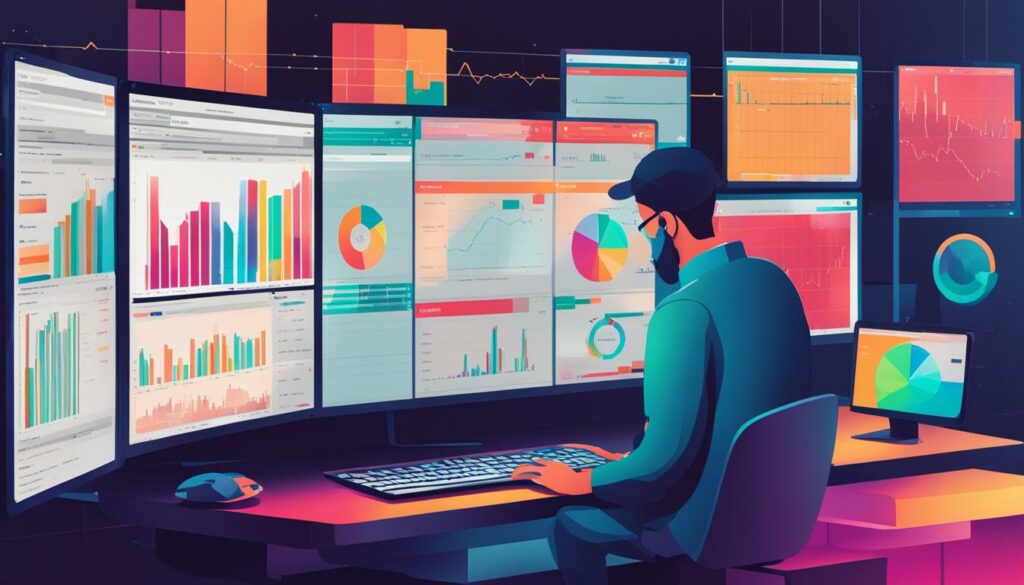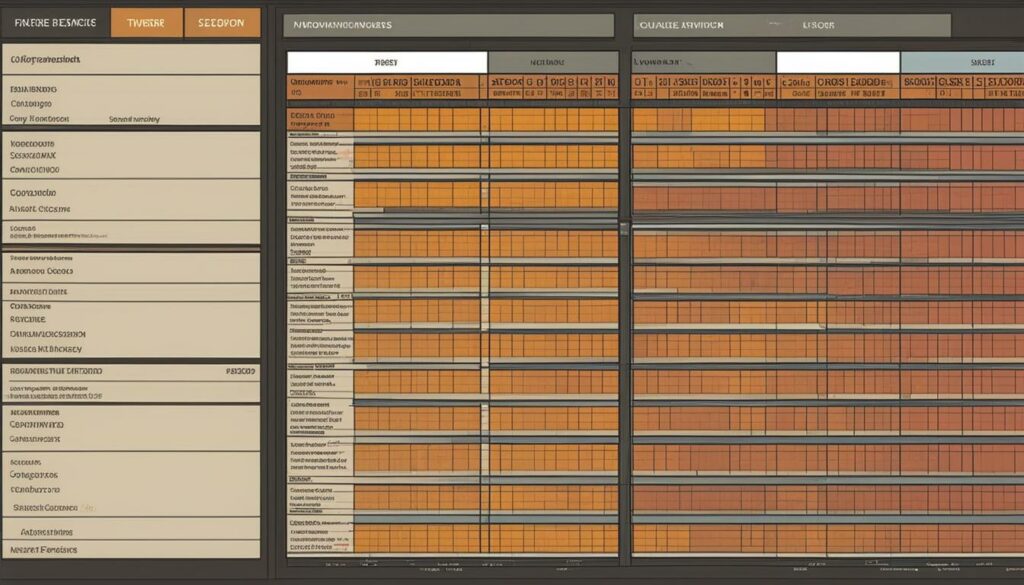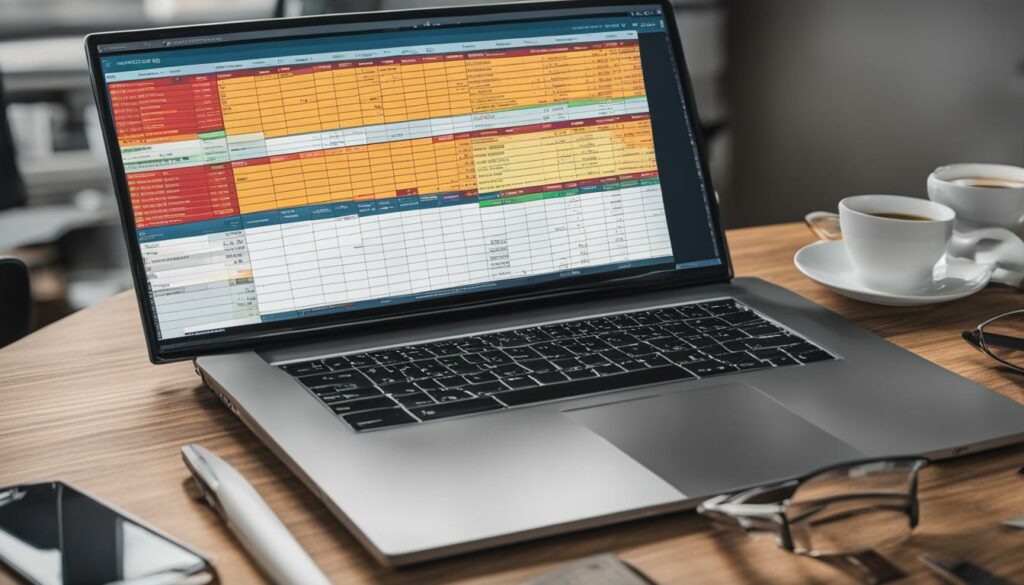In the world of ecommerce, managing financial transactions and maintaining accurate records is crucial for the success and growth of a business. One essential component of ecommerce accounting is the general ledger. Let’s explore what a general ledger is and why it is important for ecommerce businesses.
Key Takeaways:
- A general ledger is a vital part of the bookkeeping system for ecommerce businesses.
- It serves as the main ledger that summarizes all financial transactions.
- The general ledger is used to generate important financial statements such as the balance sheet and profit and loss statement.
- Maintaining an accurate general ledger is essential for effective financial reporting and analysis.
- Properly managing the general ledger helps businesses gain insights into their financial health and make informed decisions.
Definition and Importance of General Ledger
The general ledger is a fundamental component of accounting software that plays a crucial role in recording and summarizing all financial transactions within an organization. It serves as the central repository for tracking and categorizing various business operations, enabling accurate financial reporting and analysis.
One of the key functions of the general ledger is to provide visibility into the financial health of the business. By consolidating transactional data from different departments and operational activities, the general ledger offers a comprehensive picture of the company’s overall financial position.
The general ledger is essential for maintaining organized and accurate financial records. It helps ensure that financial transactions are properly classified and recorded according to specified categories, known as the chart of accounts. This classification is crucial for generating reliable financial statements such as balance sheets, income statements, and cash flow statements, which provide valuable insights into the company’s performance, profitability, and liquidity.
Effective general ledger management is vital for businesses of all sizes and industries, including ecommerce. With a well-maintained general ledger, companies can track revenue and expenses, monitor cash flow, analyze profitability, and comply with regulatory requirements.
“The general ledger serves as the backbone of the accounting system, offering a comprehensive view of the company’s financial activities and ensuring the accuracy and integrity of financial reporting.”
The general ledger plays a central role in financial reporting, providing data that is critical for decision-making, budgeting, forecasting, and strategic planning. It empowers business owners, executives, and stakeholders with the necessary information to make informed and sound financial decisions, driving the success and growth of the company.
Benefits of a Well-Managed General Ledger
A well-managed general ledger offers numerous benefits for businesses:
- Accurate financial reporting: The general ledger ensures that financial statements reflect the true financial position and performance of the company.
- Compliance with regulations: Proper general ledger management helps meet regulatory requirements and facilitates audits.
- Data analysis and decision-making: The general ledger provides comprehensive financial data for analysis, enabling informed decision-making and strategic planning.
- Budgeting and forecasting: A reliable general ledger aids in creating budgets and forecasts, helping to allocate resources efficiently and optimize financial performance.
- Improved visibility: With a well-maintained general ledger, businesses gain greater visibility into their financial operations and can identify trends, patterns, and areas for improvement.
- Enhanced financial control: A properly managed general ledger enables businesses to establish strong financial control measures and safeguard against fraud and errors.
Overall, the importance of the general ledger in ecommerce and other industries cannot be overstated. It serves as the foundation for accurate financial reporting, robust business operations, and informed decision-making, ensuring the financial health and success of the organization.
Maintaining and Reconciling the General Ledger
To ensure the accuracy and integrity of the general ledger, regular account reconciliations should be performed. This process involves verifying account balances against supporting documentation such as bank statements and invoices. Cloud-based accounting software makes it easier to automate reconciliations for accounts like bank and credit card accounts.
Account reconciliations are crucial for maintaining financial accuracy and integrity. By comparing the general ledger with external documentation, businesses can identify discrepancies and errors, ensuring that financial records are reliable and trustworthy.
Automating Reconciliations with Cloud-Based Accounting Software
Cloud-based accounting software offers advanced features that simplify the reconciliation process. Leveraging automation tools, businesses can streamline reconciliations for accounts such as bank and credit cards, reducing manual effort and enhancing accuracy.
With reconciliation features, the software matches transactions from external sources, such as bank statements, with corresponding entries in the general ledger. Any disparities are flagged, allowing for timely investigation and resolution.

Maintenance Procedures for a Clean General Ledger
In addition to account reconciliations, maintaining the general ledger requires various procedures to ensure data accuracy and financial integrity. Here are some key maintenance procedures:
- Making closing entries: At the end of an accounting period, closing entries transfer balances from temporary accounts to the appropriate permanent accounts, preparing the ledger for the next period.
- Reviewing and removing unused accounts: Regularly reviewing the general ledger helps identify accounts that are no longer in use. Removing these unused accounts streamlines reporting and minimizes clutter.
- Purging old transactions: Periodically purging old transactions keeps the general ledger up-to-date and prevents it from becoming excessively large and unwieldy.
- Checking for duplicate entries: Duplicate entries can skew financial data and compromise accuracy. Regularly checking for and eliminating duplicate entries is essential for maintaining the integrity of the general ledger.
- Comparing general ledger totals to the trial balance: Periodically comparing the total balances in the general ledger to the trial balance helps identify any discrepancies, ensuring the accuracy of financial records.
By following these maintenance procedures, businesses can ensure that their general ledger remains clean, up-to-date, and accurate, facilitating efficient financial management and reporting.
Importance of a Clean General Ledger in Ecommerce
A clean and accurate general ledger is paramount for ecommerce businesses. It plays a crucial role in ensuring the quality and reliability of financial statements and reports that guide critical business decisions. With accurate financial information, businesses can make informed decisions, plan strategically, and analyze their performance effectively.
Regularly reconciling accounts and following best practices for general ledger maintenance are essential in maintaining data accuracy and integrity. By reconciling accounts, businesses can identify and correct errors or discrepancies promptly, minimizing the risk of inaccurate financial reporting.
A clean general ledger ensures the integrity of accounting data, enabling businesses to confidently utilize the information for analysis, planning, and strategy. It provides a reliable foundation for financial reporting, allowing businesses to meet compliance requirements and present accurate and transparent financial statements to stakeholders.
“A clean general ledger is the bedrock of financial reporting, ensuring the accuracy and reliability of accounting data. It empowers businesses to make well-informed decisions based on trustworthy financial information.”
Furthermore, maintaining a clean general ledger facilitates efficient financial reporting. Accurate and well-organized data allows for easy extraction and analysis, saving valuable time and effort during the reporting process. Businesses can promptly generate financial statements, including income statements, balance sheets, and cash flow statements, with confidence in the accuracy of the reported figures.
By leveraging a clean general ledger, ecommerce businesses also gain a better understanding of their financial health and performance. They can analyze revenue and expenses, track profitability, and identify areas for improvement. Accurate financial data enables businesses to evaluate the effectiveness of their strategies, optimize operations, and drive growth.
Benefits of a Clean General Ledger in Ecommerce:
- Ensures accuracy and integrity of financial statements
- Fosters confidence in accounting data for decision-making
- Facilitates compliance with regulatory requirements
- Streamlines financial reporting processes
- Provides insights for analyzing financial performance
- Supports strategic planning and optimization of operations
Having a clean general ledger is imperative for ecommerce businesses to maintain financial data accuracy, ensure reliable financial reporting, and drive growth and success in the dynamic digital landscape.

Leveraging Technology for Efficient General Ledger Management
In today’s digital age, technology has revolutionized various aspects of business operations, including general ledger management. With the advent of modern accounting software, particularly cloud-based solutions, businesses can now optimize their general ledger management processes and improve overall efficiency.
One of the key advantages of using general ledger software is automation. These software solutions automate various tasks associated with general ledger management, such as data entry, journal entries, and transaction categorization. By eliminating manual work, automation reduces the chances of errors and saves valuable time for businesses.
Another significant benefit is remote access. Cloud-based general ledger software allows authorized users to access and manage financial data from anywhere, anytime. Whether you’re on a business trip or working from home, you can conveniently review, edit, or reconcile your general ledger without being constrained by physical location.
Reconciliation features are also instrumental in efficient general ledger management. These features enable businesses to reconcile their general ledger accounts with external sources such as bank statements or credit card statements. By automating this process, discrepancies and errors can be identified quickly, ensuring the integrity and accuracy of financial data.
Furthermore, modern accounting systems provide transparency through audit trail reports. These reports track and record every change made to the general ledger, enhancing accountability and facilitating easy audit processes. Audit trail reports play a crucial role in maintaining the trustworthiness of financial data.
“The integration of automation, remote access, reconciliation features, and audit trail reports in general ledger software has revolutionized the way businesses manage their financial data. It has streamlined processes, enhanced accuracy, and provided valuable insights for informed decision-making.”

By leveraging technology, businesses can streamline general ledger maintenance processes, reduce manual work, and improve overall efficiency in managing financial data. General ledger software is a valuable tool that empowers businesses to stay organized, ensure accuracy, and make informed financial decisions.
| Benefits of General Ledger Software | |
|---|---|
| Automation of routine tasks | Reduce manual work and minimize errors |
| Remote access | Manage financial data from anywhere, anytime |
| Reconciliation features | Quickly identify discrepancies and errors |
| Audit trail reports | Enhance transparency and accountability |
Note: Table showcasing the benefits of general ledger software.
Using the General Ledger to Improve Expense Management
The general ledger plays a crucial role in managing expenses effectively for ecommerce businesses. By utilizing the general ledger report, businesses can gain valuable insights that enable them to analyze and track expenses in detail. This in-depth understanding allows for informed decision-making regarding budgeting, cost control, and resource allocation. Through the comprehensive view provided by the general ledger, businesses can optimize their expense management strategies and identify trends that impact their financial performance.
Regularly reviewing the general ledger report allows businesses to identify patterns and outliers within their expense categories. By analyzing these patterns, businesses can make informed decisions when creating and adjusting budgets. They can identify areas of overspending or opportunities for cost savings, allowing for better financial planning and resource allocation. Additionally, the general ledger report enables businesses to compare actual expenses against budgeted amounts, providing a clear picture of their financial performance.
Financial analysis is a vital component of expense management, and the general ledger report is a valuable tool in this regard. By examining expense data from the general ledger, businesses can conduct detailed financial analyses, such as cost variance analysis and trend analysis. These analyses provide valuable insights into cost drivers and potential areas for improvement. By identifying cost-saving opportunities, businesses can optimize their operations, enhance profitability, and achieve their financial goals.
Example General Ledger Report
| Date | Expense Category | Amount |
|---|---|---|
| 2022-01-01 | Advertising | $1,000 |
| 2022-01-02 | Shipping | $500 |
| 2022-01-03 | Website Maintenance | $300 |
| 2022-01-04 | Inventory | $1,500 |
By utilizing the general ledger report, businesses can easily track their expenses and identify the most significant cost drivers. They can streamline their expense management processes, ensure accurate allocation of resources, and make proactive decisions based on real-time financial data.

General Ledger and Double-Entry Bookkeeping
The general ledger functions based on the principles of double-entry bookkeeping. In this system, each financial transaction is recorded in two different accounts as both a debit and a credit. This ensures that the accounting equation, which states that assets equal liabilities plus equity, remains balanced.
The general ledger plays a crucial role in preparing the trial balance. The trial balance is a statement that lists all the debit and credit balances from the general ledger. Its main purpose is to ensure that the total debits and credits are equal, resulting in a net-zero difference.
Double-entry bookkeeping is fundamental for maintaining accuracy in financial records. It provides a mechanism to identify errors or discrepancies in the recording of transactions. By following this method, businesses can ensure the integrity of their financial data and have a solid foundation for generating meaningful financial reports and analysis.
FAQ
What is a general ledger?
A general ledger is the main ledger that summarizes all transactions and financial events for a company. It provides a comprehensive record of debit and credit account balances and is used to generate important financial statements such as the balance sheet and profit and loss statement.
Why is the general ledger important in ecommerce?
The general ledger is crucial for effective financial reporting and analysis in the world of ecommerce. It tracks and categorizes transactions specific to the industry, such as online sales, payment processing fees, website costs, shipping expenses, and sales taxes. It provides valuable insights into the financial health of the business.
How do I maintain and reconcile the general ledger?
Regular account reconciliations should be performed to ensure accuracy and integrity. This involves verifying account balances against supporting documentation. Cloud-based accounting software can automate reconciliations for accounts like bank and credit cards. Other maintenance procedures include making closing entries, reviewing and removing unused accounts, purging old transactions, checking for duplicate entries, and comparing general ledger totals to the trial balance.
Why is a clean general ledger important in ecommerce?
A clean general ledger ensures data accuracy and integrity, allowing businesses to confidently use their accounting data for analysis, planning, and strategy. It directly impacts the quality of financial statements and reports that guide critical business decisions.
How can technology help with general ledger management?
Modern accounting software, particularly cloud-based solutions, provide tools to optimize general ledger management. It allows remote access and collaboration, automates reconciliations for accounts like bank and credit cards, and provides transparency through audit trail reports. Leveraging technology helps streamline processes, reduce manual work, and improve overall efficiency in managing financial data for ecommerce businesses.
How can I use the general ledger to improve expense management?
By regularly reviewing the general ledger report, businesses can analyze and track expenses in detail, identify trends, and make informed decisions related to budgeting, cost control, and resource allocation. The general ledger provides a comprehensive view of all financial activities, allowing businesses to gain insights into their spending patterns and optimize expense management strategies.
What is the relationship between the general ledger and double-entry bookkeeping?
The general ledger operates based on the principles of double-entry bookkeeping, where every entry is recorded as both a debit and credit in two different accounts. This ensures accuracy and helps identify errors or discrepancies in financial records. The accounting equation, which states that assets equal liabilities plus equity, is maintained through this balancing act. The general ledger plays a vital role in preparing the trial balance, which ensures that all debits and credits are in balance.
